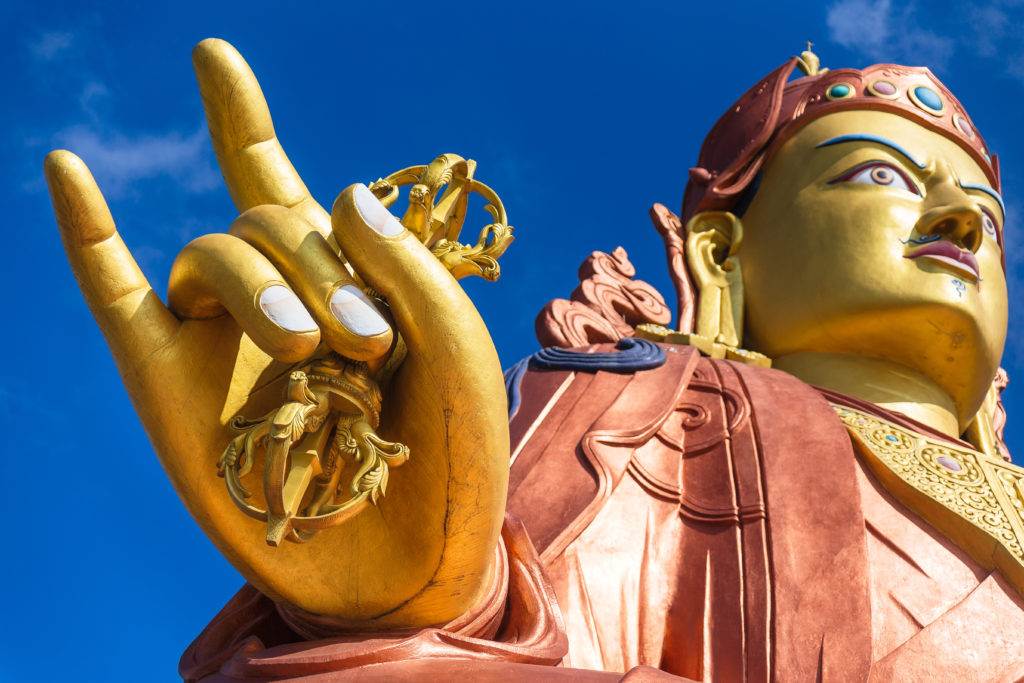Some people believe that the eternal Spirit manifests in our human world in the form of peace and equanimity and tranquility. Others believe that it manifests as a passionate desire to grow and evolve. Some believe that it manifests as the flowering of our individuality. Others believe that it manifests as all-inclusive transcendent unity.
One manifestation and expression of the Absolute in our relative human experience is in the form of paradox. Essential paradoxes abound in the spiritual quest. To wit: Who wants to be free of ego? How can a passion for liberation lead to a passionless state? How can effort lead to effortlessness? What is a spiritual journey if there is nowhere to go? And yes, the spiritual teacher-student or guru-disciple relationship is particularly rife with paradox.
Consider the paradox of surrender and autonomy. Surrender or submission to a living teacher has been recognized in many traditions as essential to the spiritual journey—a pillar in the student’s quest to transcend the ego-personality and allow for the emergence of a deeper Self. Paradoxically, and specially in modern times, autonomy or individuation has also been recognized by psychologists and spiritual teachers to be an essential pillar of the same journey. In the words of Omraam Mikhaël Aïvanhov in What Is a Spiritual Master? “Everybody has his own path, his mission, and even if you take your Master as a model, you have to sing the part which has been given to you, with your own voice, which is certainly not that of your Master.”
Both surrender and autonomy are essential for the journey to lead to well-rounded spiritual maturation. Surrender and autonomy are also incompatible with each other. Their coexistence is a paradox.
Another central paradox in the teacher-student relationship is its being both absolutely impersonal and deeply personal. On the one hand, what pulls student and teacher to each other and binds them together is, ideally, the Ātman or the true or authentic Self, which is beyond bodies, personalities, life stories, and any individual characteristic. In the words of an interviewee in Spiritual Transmission, “When you discover the real relationship with your teacher you discover that there is no other. You actually need the other to realize that there is no other.”

And yet for many who have experienced the student-teacher dynamic it is the closest and most intimate personal relationship. In the words of Mariana Caplan in The Guru Question, “The felt experience of the relationship between student and teacher is the most deeply personal bond of love and reverence he or she has ever known.”
Yet another paradox is that of trust and discrimination. The student naturally and sometimes desperately wants to be able to wholeheartedly and unconditionally trust the teacher. Such trust has a deeply soul-healing effect. Precious gifts become available to the student who is willing and able to extend it. Trust in the teacher is often a portal through which the student discovers their own inner trust and a profound trust in life. As Norman Fischer wrote in The Teacher in the West, “To remain trusting of my teachers was perhaps the greatest thing I learned, not because they turned out to be perfect and all-wise, but because I came to realize that trust was my practice and my responsibility, not theirs.”
But as we have become painfully aware, most spiritual teachers are not consistently trustworthy. Some have proven to be dangerously untrustworthy. To protect themselves, as well as their teacher, students must remain open-eyed and discriminating. The possibility that the teacher is wrong must always be kept in mind—by both teacher and student. Unconditional trust and discrimination are both essential in the teacher-student relationship despite the paradox that unconditional trust and discrimination cannot co-exist.
Paradox is at the heart of the spiritual teacher-student relationship—it makes us feel uncomfortable. When faced with paradox, our natural tendency is to seek resolution. We want to know “So which is it?” since we abhor its inherent tension. We would rather choose one side and dismiss the other as opposed to remaining standing at the heart of a vibrantly living paradox.
My exploration into the spiritual teacherstudent relationship led me to the conclusion that the paradoxes inherent in this relationship are not to be “solved” but rather to be lived as dynamically and unreservedly as possible. Paradoxes are the beating heart of the spiritual teacher-student relationship. As long as they are open and alive, vibrant and dynamic—so is the relationship and the opportunity to awaken.
Amir Freimann is a spiritual seeker who explores spiritual life from within and without and is currently researching transcendence and the living experience of spiritual exemplars. His new book Spiritual Transmission: Paradoxes and Dilemmas on the Spiritual Path (published by Monkfish Books MonkfishPublishing. com) is based on his 20-year experience as a student of Andrew Cohen and 100 interviews with teachers and students from varied traditions and paths. Free2Quest.com